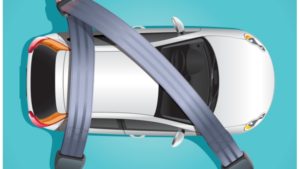
A car insurance policy is a mandatory requirement under the Motor Vehicles Act, 1988. However, the Act mandates only a third party cover which protects third party interests in any contingency. If you want to secure coverage for the damages suffered by your own vehicle, you should opt for a comprehensive policy. Furthermore, to expand the scope of coverage of a comprehensive policy, you can opt for a zero depreciation cover as well.
Table of Contents
- What is a comprehensive car insurance policy?
- What is a zero depreciation car insurance policy?
- Applicable depreciation rates on zero dep vs comprehensive plans
- Comparative analysis of comprehensive insurance vs zero depreciation insurance
- Should you buy a zero depreciation cover?
Let’s understand the concepts of comprehensive vs zero dep coverage options and have a look at their comparative analysis.
What is a comprehensive car insurance policy?
A comprehensive car insurance policy is one that covers third party liabilities as well as the damages suffered by the car itself. The policy is issued for one year after which you can renew it for as long as you own a car.
What is a zero depreciation car insurance policy?
A comprehensive car insurance policy does not cover the depreciation suffered by the parts of the car due to normal wear and tear. As such, when a claim is made, the relevant depreciation is deducted from the claim amount leaving you to pay the depreciation cost from your own pockets. A zero depreciation policy protects you against such out-of-pocket expenses. It is a comprehensive car insurance policy that also includes the zero depreciation add-on. The policy covers third party liabilities, the damages suffered by the car as well as the depreciation suffered by the car’s parts. If there is a claim, the insurance company does not deduct any depreciation from the parts repaired or replaced. It pays the full repair costs incurred.
In simpler terms, a zero depreciation car insurance policy is a comprehensive car insurance policy with the added coverage of a zero depreciation add-on.
Applicable depreciation rates on zero dep vs comprehensive plans
Here are the applicable depreciation rates which would be applied on your car’s parts in a comprehensive vs zero dep policy–
| Parts of the car | Only comprehensive policy | Zero depreciation policy |
|
Nylon, rubber or plastic parts of the car |
50% depreciation |
Nil depreciation |
|
Fibre glass parts of the car |
30% depreciation |
Nil depreciation |
|
Glass parts of the car |
Nil depreciation |
Nil depreciation |
Suppose a claim occurs wherein the rubber parts are repaired at a cost of INR 20,000 and the fibre glass parts are repaired at a cost of INR 10,000. The claim payable under a zero dep vs comprehensive plan would be as follows –
| Parts of the car repaired | Admissible claim in a comprehensive policy | Admissible claim in a zero depreciation policy |
|
Rubber parts |
50% of INR 20,000 = Rs.10,000 |
100% of INR 20,000 = INR 20,000 |
|
70% of INR 10,000 = Rs.7000 |
100% of INR 10,000 = INR 10,000 |
|
|
Total admissible claim |
INR 17,000 |
INR 30,000 |
While in the comprehensive policy you would have to bear a depreciation cost of INR 13,000 (INR 30,000 – INR 17,000), in a zero depreciation policy you would not have to bear any depreciation cost. The total claim of INR 30,000 would be paid by the insurance company.
Comparative analysis of comprehensive insurance vs zero depreciation insurance
Here is a comparative look into comprehensive insurance vs zero depreciation insurance for you to understand both these plans easily –
1. Similarities
-
- Both plans cover third party liabilities as well as damages suffered by the car
- Both the plans are voluntary in nature
- Both the plans allow no claim bonus discounts as well as other premium discounts for safety gadgets, membership of Automobile Association, etc.
- Cashless claims are allowed under both the plans
- The coverage duration of both the policies is one year
- You can choose other add-on coverage benefits with both the plans
2. Difference between Comprehensive and Xero depreciation insurance
| Points of difference | Comprehensive insurance | Zero depreciation insurance |
|
Scope of cover |
Coverage for third party liability and own damage only |
Coverage for third party liability, own damage and depreciation on the car’s parts |
|
Premium |
Lower compared to zero depreciation policy |
Higher due to wider coverage |
|
Claim pay-out |
Lower because depreciation is deducted from the claim amount |
Higher because depreciation is not deducted from the claim amount |
|
Availability |
Available for cars of all ages |
Available for cars aged up to 5 years |
|
Number of claims |
Unlimited claims can be made as long as the IDV of the policy is not used up |
There might be a limitation on the number of claims for zero depreciation that you can make. |
Should you buy a zero depreciation cover?
The repairs of the car, especially in case of severe damages, incur considerable amounts of money. Moreover, if your car is an expensive one, the costs can be financially damaging. A zero depreciation policy, therefore, is a better option for ensuring that your out-of-pocket expenses are reduced. It provides a wider scope of coverage and allows you to get a higher settlement at the time of claims. So, it is always better to opt for a zero depreciation cover for your car.
That being said, when buying a zero depreciation cover, you should always compare the premiums across several insurance companies. Every company has its own pricing policy and so, the premiums differ across different insurers. Add the zero depreciation add-on to the coverage and compare the premiums across insurers. Choose a policy that offers the lowest premium without compromising on the Insured Declared Value or the coverage of the policy.
To compare, you can choose Turtlemint that offers you the choice of the best zero depreciation plans available in the market. Visit https://www.turtlemint.com/car-insurance/ and enter your car details to check out the quotes of leading insurers. Compare and choose the best zero depreciation policy and insure your car under the widest coverage.
Frequently Asked Questions
1. How many claims can I make under a zero depreciation cover?
The maximum limit to zero depreciation claims depends on the insurance company from where you buy the policy. Usually, many companies allow a maximum of two claims during the policy tenure. Some companies, however, also allow unlimited zero depreciation claims with their plans. So, find out the limit when buying the policy so that you know how many claims can be made on a zero depreciation basis.
2. Can I convert my comprehensive policy to a zero depreciation policy?
Yes, you can add the zero depreciation add-on to your comprehensive car insurance policy and convert it into a zero depreciation policy. This addition can be done either at the time of buying a new policy or when renewing an existing one.
3. Is an additional third party policy required with zero depreciation cover?
No, you don’t have to buy an additional third party cover with the zero depreciation policy. This is because the third party coverage comes inbuilt in the zero depreciation policy itself.
4. Can I opt-out of the zero depreciation cover?
Yes, at the time of renewal of the car insurance policy, you can opt-out of zero depreciation cover by opting out of the zero depreciation add-on benefit. Moreover, once your car is more than 5 years old, the zero depreciation cover would automatically be removed when your policy is renewed in the sixth year.
5. Do all insurers offer zero depreciation insurance?
Yes, all general insurance companies that offer a comprehensive car insurance policy offer zero depreciation add-on. You can add the add-on to the comprehensive policy to opt for the zero depreciation cover.




























